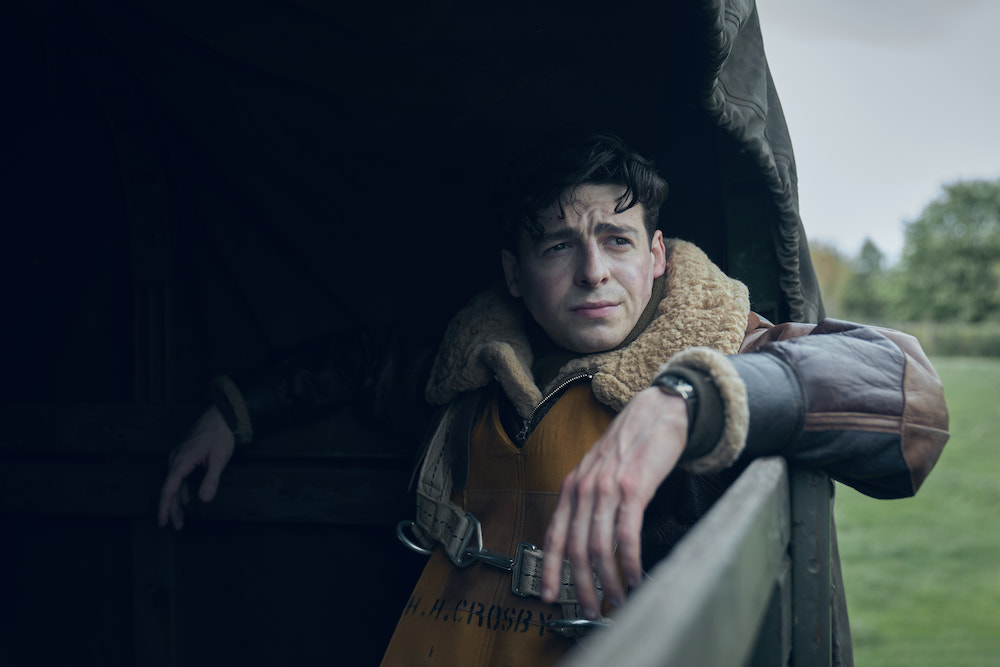There are many faces to war, and Apple TV+’s ‘Masters of the Air’ presents it to the audience from different perspectives. The series focuses on the exploits of the 100th Bomb Group, with every member’s storyline given the attention it deserves. In every episode, several men become the casualties of war, while others have to walk a different path after surviving a near-death experience. In the fourth episode of the series, the story strips away the action and leaves us with a greater plot development. While we don’t get to be in the heat of the battle, it doesn’t mean the 100th doesn’t suffer losses. Many men don’t make it back, and Benny DeMarco and Harry Crosby are among them. What happens to them? Do they survive the crash and make it back to the base? SPOILERS AHEAD.
Bernard DeMarco Became A Prisoner of War

Captain Bernard DeMarco was one of the 11 men who had to bail when the mission to Bremen went awry. After the plane was left in a severe state due to the attack by the Nazi forces, DeMarco jumped and landed near Essen in Germany. Finding himself in enemy territory, DeMarco’s chances of escape were slim to none. He was soon captured by the Nazi forces, and like his fellow American officers who were also captured, he was taken to Frankfurt for interrogation. Later, he was sent to Stalag Luft 3 Sagan-Silesia Bavaria for imprisonment and thereafter moved to Nuremberg-Langwasser.
Nothing much is known about DeMarco’s fate after this, though it is confirmed that he did make it back alive. There are no accounts that speak of his time in the enemy camp and nothing to confirm how and when he came back to the base. No matter how things might have happened, DeMarco got to go back home and live the rest of his life happily with his family. On December 28, 1946, he married Rita Ann Sullivan. He died at the age of 74 on August 19, 1992, in Florida.
Harry Crosby Survived the Plane Crash
While there were men like Benny DeMarco and Gale Cleven who landed in enemy territory and were taken prisoners of war, Harry Crosby and his crew-mates were a bit luckier than them. While their plane sustained a lot of damage during the mission, it was strong enough to start the journey back home, though it didn’t get all the way back. Due to multiple technical failures, the plane was forced to crash land in a field in Ludham, England and ended up hitting a tree. Crosby and the others eventually made their way back to Thorpe Abbotts Air Base in East Anglia and resumed duty.

A lot of men didn’t survive the war, but Harry Crosby wasn’t one of them. He completed all 25 missions, which was the maximum number of missions they needed to finish to be taken out of rotation. However, it didn’t bring Crosby’s career in the Air Force to an end, as he was promoted soon after and ended up doing seven more missions. When Germany surrendered in May 1945, Crosby, like many of his fellow officers, finally got to go home. By then, he had earned the rank of Lt. Colonel. For his service, he was awarded the Distinguished Flying Cross, the Air Medal, Bronze Star, and Croix de Guerre, among others.
He later penned ‘A Wing and a Prayer: The “Bloody 100th” Bomb Group of the U.S. Eighth Air Force in Action over Europe in World War II,’ in which he recounted his experience in the war. Once back home, Harry Crosby became even busier. He got his MA from Iowa in 1947 and then his Ph.D. in 1953 from Stanford. He acted as the Writing Supervisor of the Rhetoric Program and taught English composition and American literature at Iowa City. Crosby later accepted a faculty position at the College of Basic Studies at Boston University, which he left in 1984.
Crosby also served as Director of the Writing Center at Harvard University and later helped develop the curriculum at the Air Force Academy in Colorado Springs. In 1960, he served as the Director of Studies for the Pakistani Air Academy in Risalpur, Pakistan, for two years. Crosby was married to Jean Evelyn Boehner, with whom he had four children. She died of cancer in 1980. In 1982, he married Mary Alice Tompkins Brennan and had a grand family full of children, grandchildren, and great-grandchildren. He died peacefully at the age of 91 on July 28, 2010, at Jesmond Nursing Home in Lynn, surrounded by his family and friends.
Read More: Masters of the Air: How Did Sgt. Ken Lemmons Die?


You must be logged in to post a comment.